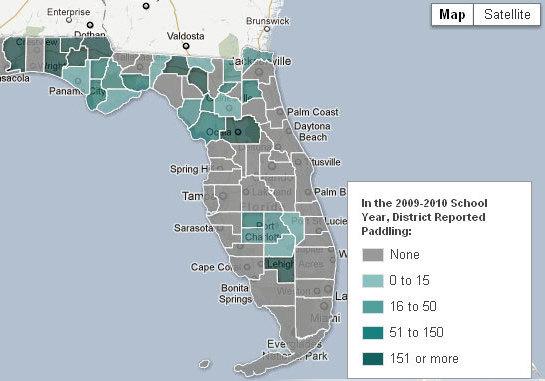In a significant shift affecting disciplinary practices across Florida’s public schools, a newly enacted law now mandates parental consent prior to the administration of corporal punishment. The legislation, aimed at reinforcing parental authority and oversight, requires teachers and school officials to obtain explicit sign-off from parents before any physical discipline can be applied. Advocates hail the measure as a crucial step in protecting students’ rights and promoting transparency, while critics raise concerns about its potential impact on school safety and classroom management. This development marks a pivotal moment in the ongoing debate over the role of corporal punishment in education within the Sunshine State.
Parental Consent Now Mandatory for Corporal Punishment in Florida Schools
Florida’s educational landscape has shifted significantly with the recent legislation mandating explicit parental consent before any form of corporal punishment can be administered in public schools. This policy, championed under the banner of safeguarding parental rights, seeks to ensure that guardians have a direct say in disciplinary actions involving physical measures. Schools must now secure documented approval from parents or legal guardians beforehand, effectively making spontaneous corporal disciplinary actions a thing of the past.
Key implications of this law include:
- Strict documentation and record-keeping of parental consents.
- Clear communication channels established between schools and families.
- A potential decline in the use of corporal punishment due to procedural hurdles.
| Requirement | Impact |
|---|---|
| Written Consent | Mandatory before punishment |
| Parental Notification | Must be immediate and documented |
| Record Keeping | Schools must archive consents securely |
Impact on School Disciplinary Practices and Student Wellbeing
Schools across Florida are now navigating a complex landscape shaped by this new legislation, which mandates explicit parental consent before administering corporal punishment. Educators express concern that this additional requirement could delay or deter disciplinary actions, potentially undermining established classroom management strategies. This shift places a heavier burden on school administrators to document and secure timely parental signatures, adding administrative hurdles that could inadvertently impact the consistency of student discipline.
Beyond logistics, questions about student wellbeing are at the forefront of discussions. Advocates warn of the potential for increased disciplinary disparities, noting that students from less engaged or harder-to-reach families may face uneven enforcement of consequences. The law’s emphasis on parental rights may empower some families, but it risks alienating others and complicating efforts to create a uniformly safe and supportive school environment. Key concerns highlighted include:
- Delayed disciplinary response impacting classroom order
- Unequal application of discipline tied to parental involvement
- Heightened stress among students caught in procedural limbo
- Increased administrative workload for teachers and staff
| Aspect | Positive Outcomes | Challenges |
|---|---|---|
| Parental Engagement | Greater involvement in disciplinary decisions | Potential delays in consent process |
| Student Wellbeing | Protection from unapproved corporal punishment | Unequal enforcement risks frustration |
| School Administration | Clear documentation and accountability | Increased workload and procedural barriers |
Legal and Ethical Debates Surrounding the New Parental Rights Law
As Florida moves forward with its new parental rights law mandating parental consent for corporal punishment in schools, legal experts and advocates are clashing over its implications. Proponents argue this measure strengthens parental authority and protects children from potential abuse, emphasizing that parents should be the primary decision-makers regarding disciplinary methods. However, critics warn the law could infringe on educators’ ability to maintain classroom discipline and create administrative bottlenecks, potentially delaying necessary interventions.
This debate also raises profound ethical questions, sparking concerns over the balance between student welfare and parental control. Opponents highlight risks such as inconsistent enforcement and the possibility of some parents withdrawing consent to avoid accountability. Supporters, meanwhile, underscore the importance of safeguarding children’s rights within educational settings and ensuring transparent communication. Below is a summary of key perspectives presented in the ongoing discussions:
- Supporters’ Viewpoint: Upholding parental authority and preventing child abuse.
- Opponents’ Concerns: Potential delays in discipline and strain on teachers.
- Ethical Ambiguities: Balancing student protection with parental freedoms.
- Legal Challenges: Possible conflicts with existing educational policies.
| Stakeholder | Primary Concern | Potential Impact |
|---|---|---|
| Parents | Consent for disciplinary actions | Greater control over child’s education |
| Teachers | Classroom management challenges | Administrative delays and friction |
| Students | Protection from harm | Enhanced safeguards or inconsistent discipline |
| Policy Makers | Balancing rights and responsibilities | Legal and ethical precedents |
Guidance for Parents and Educators Navigating the Sign-Off Requirement
Florida’s recent legislation demands active parental involvement by requiring explicit consent before any form of corporal punishment can be administered in schools. Parents and educators should familiarize themselves with the sign-off process to ensure compliance and maintain transparent communication. Schools must distribute clear consent forms at the beginning of the academic year, outlining the circumstances under which corporal punishment might be considered. For parents, this is an opportunity to engage directly with school administrators and clarify your preferences regarding disciplinary measures affecting your child.
Educators are encouraged to maintain detailed records of all signed consents and foster alternative discipline strategies aligned with state guidelines. It is essential for schools to establish
open communication channels where parents receive timely updates when disciplinary issues arise. The following steps can aid in navigating this new requirement effectively:
- Distribute and collect signed consent forms promptly each school year.
- Train staff on legal documentation and respectful disciplinary alternatives.
- Implement clear policies for immediate parental notification after incidents.
- Regularly review consent preferences and update records accordingly.
| Responsibility | Action |
|---|---|
| Parents | Return signed consent forms & discuss concerns |
| Educators | Document consents & explore non-physical approaches |
| School Admin | Ensure policy compliance & facilitate training |
Closing Remarks
As Florida moves forward with this new legislation mandating parental consent for corporal punishment in schools, the debate over discipline, authority, and children’s rights remains at the forefront of educational policy discussions. Advocates argue the law strengthens parental involvement, while critics question its impact on school administration and student behavior. The coming months will reveal how this measure reshapes the landscape of school discipline across the state.







